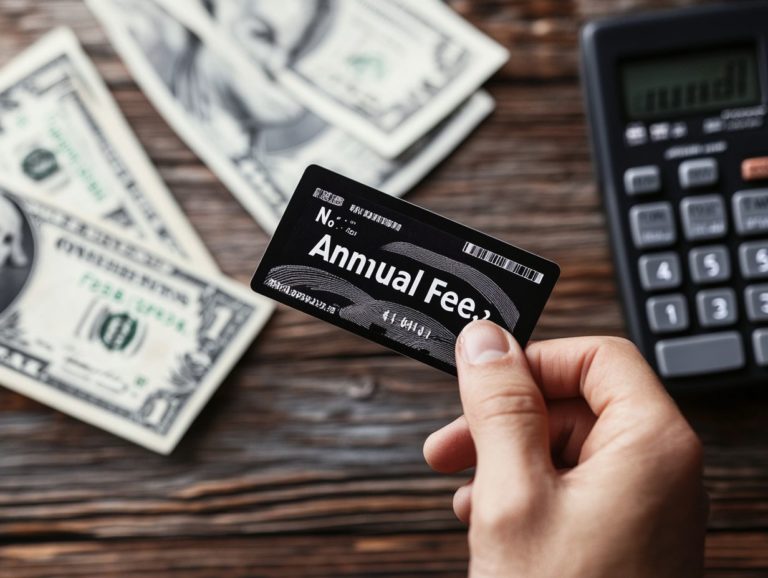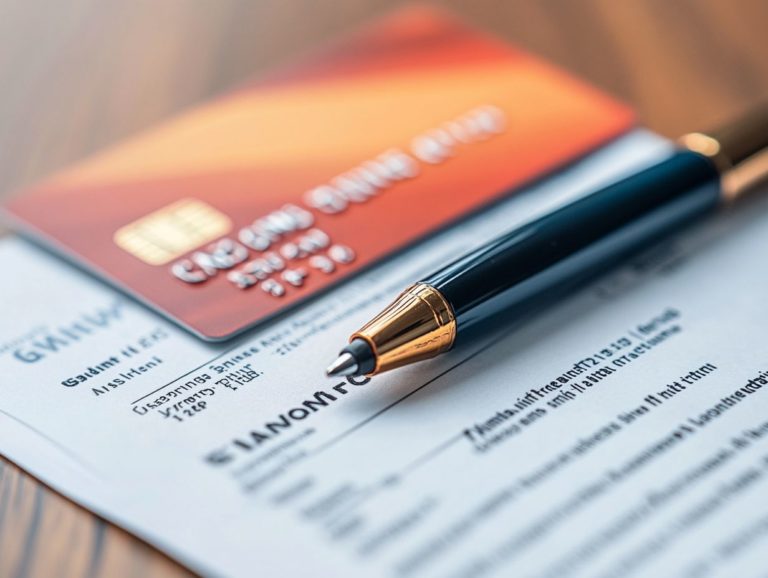What is a Credit Card Fraud Alert?
Credit card fraud is an ever-growing concern, making it essential for you to remain vigilant. Protect yourself from credit card fraud today! One effective tool at your disposal is the credit card fraud alert, specifically designed to notify you of any suspicious activity on your account. Let s explore what credit card fraud alerts are, their purpose, and the various types available.
You ll discover how they work, the steps to set them up, and an overview of their benefits and limitations. By understanding these alerts, you can significantly enhance your financial security.
Contents
Key Takeaways:

- A credit card fraud alert is a notification system that informs you of potential fraudulent activity on your credit card.
- Alerts can be temporary (lasting 90 days) or permanent. You must verify your identity before any action is taken.
- Setting up a fraud alert can protect against identity theft and fraud, but it is not a foolproof solution and has limitations on what it can prevent.
Understanding Credit Card Fraud Alerts
Understanding credit card fraud alerts is essential for anyone looking to protect themselves against identity theft and fraudulent activity. These alerts act as an important safety measure, notifying credit bureaus such as Equifax, Experian, and TransUnion whenever suspicious activity arises on your credit card account.
When you initiate a fraud alert, creditors must verify your identity, effectively minimizing the risk of unauthorized purchases and safeguarding your personal information. Taking active steps toward financial security can greatly diminish the potential liability tied to credit fraud.
Definition and Purpose
A fraud alert is a notification placed on your credit report, designed to prompt creditors to take extra steps to verify your identity when extending credit. This alert acts as a vital safeguard against identity theft, signaling to lenders that they need to exercise caution and confirm your identity before approving any credit transactions.
Think of it as a red flag, encouraging financial institutions to conduct due diligence by requesting additional documentation or even making a personal verification call. You have the right to request these alerts, empowering you to take active steps to protect your financial information.
Types of Credit Card Fraud Alerts
You ll encounter various types of credit card fraud alerts, each tailored to suit different consumer needs and scenarios. Temporary alerts generally last for 90 days and can be easily renewed, providing flexibility during your time of concern. In contrast, permanent alerts stay in place until you decide to remove them, offering ongoing protection.
If you’ve experienced identity theft and have a police report, you can opt for extended fraud alerts. For those in the military, there s an active duty alert specifically designed to shield service members from potential identity theft while they are deployed.
Temporary vs. Permanent Alerts
Temporary alerts and permanent alerts serve distinct roles in fraud detection. Temporary alerts provide short-term protection for consumers seeking immediate assistance, essential for identity theft prevention strategies during specific concerns such as upcoming travel plans or known exposure to compromised information.
In contrast, permanent alerts deliver ongoing vigilance, catering to individuals at increased risk of identity theft due to past incidents or other circumstances. You might find temporary alerts preferable during times of heightened anxiety, while permanent alerts could be more fitting for those requiring consistent, robust monitoring. Each type offers unique advantages, allowing you to customize your approach to align with your specific needs and achieve peace of mind.
How Credit Card Fraud Alerts Work

Credit card fraud alerts operate through a careful notification process designed to inform creditors and companies that track your credit history about the potential risk of identity theft. This system ensures that all relevant parties are promptly alerted, protecting your financial interests with the utmost vigilance.
Notification and Verification Process
The notification and verification process tied to credit card fraud alerts includes several important steps designed to protect you from unauthorized purchases.
When a fraud alert is triggered, you ll receive a notification from your financial institution, alerting you to suspicious activity on your account. This prompts you to verify whether the transactions in question were indeed made by you.
If you confirm that the alert is legitimate, creditors will take various steps to validate your identity when you reach out to them. Expect security questions, requests for recent statements, or confirmation of personal details like your Social Security number.
You might also need to provide documentation, such as a government-issued ID or transactional receipts, ensuring that the entire verification process is as thorough and secure as possible.
How to Set Up a Credit Card Fraud Alert
Establishing a credit card fraud alert is a simple yet essential step that starts with requesting your credit report from one of the leading consumer reporting agencies Equifax, Experian, or TransUnion. This proactive measure offers an added layer of protection for your financial identity, ensuring you’re always a step ahead in safeguarding against potential fraud.
Step-by-Step Guide
To establish a credit card fraud alert, you can follow a series of straightforward steps designed to safeguard your financial information.
Start by reaching out to one of the major credit bureaus Equifax, Experian, or TransUnion. They ll take care of notifying the others for you, which adds an essential layer of protection across the board.
Be ready to request a credit report; you ll need to provide your personal details, including your name, address, Social Security number, and date of birth. This information is crucial for the bureaus to accurately verify your identity.
If you have experienced fraud, gather any relevant documentation to support your alert request, as this will bolster your claim. Each step is critical in fortifying your defenses against potential identity theft, making it increasingly difficult for fraudsters to exploit your information.
Benefits of Credit Card Fraud Alerts
The advantages of credit card fraud alerts go well beyond simple notifications; they serve as a formidable shield against identity theft and offer essential consumer protection.
Protecting Against Identity Theft and Fraud

Wondering how to protect your identity? Credit card fraud alerts are here to help! These alerts function as your personal early warning system, notifying you whenever there s suspicious or potentially unauthorized activity on your accounts. If a transaction strays from your usual spending patterns, the system springs into action, allowing you to quickly evaluate the situation.
Under consumer protection laws, you have the right to dispute fraudulent charges and are often shielded from liability for unauthorized transactions. This proactive approach not only empowers you to act swiftly but also enhances your awareness of your financial activities, highlighting the crucial role of fraud alerts in the ongoing fight against identity theft.
Limitations of Credit Card Fraud Alerts
Credit card fraud alerts serve as a vital safeguard for your financial security, yet it’s important to know their limits. Being informed about these constraints will empower you to make more astute decisions regarding your protection measures.
What Fraud Alerts Cannot Do
Fraud alerts are a useful tool, but they can t guarantee that unauthorized purchases will vanish or that identity theft will be entirely thwarted. Think of them as a safety step more of a helpful nudge than a foolproof shield.
These alerts notify creditors to take extra steps in verifying your identity before extending credit. However, they won t catch every fraudulent activity, especially if you re not regularly monitoring your accounts.
Combine fraud alerts with additional strategies for better protection. Regularly checking your account activity and considering credit freezes which restrict new access to your credit report can significantly enhance your security. This provides an extra layer of defense that fraud alerts on their own cannot deliver.
Frequently Asked Questions
What is a Credit Card Fraud Alert?
A Credit Card Fraud Alert is a safety step taken by credit card companies to protect customers from potential fraudulent activity. It is a notification sent to the cardholder when any suspicious or unusual activity is detected.
How does a Credit Card Fraud Alert work?

When suspicious activity is detected on a customer’s credit card, the credit card company will send an alert via email, text message, or phone call. The alert informs the cardholder of the suspicious activity and prompts them to take necessary actions to protect their account.
What should I do if I receive a Credit Card Fraud Alert?
If you receive a Credit Card Fraud Alert, take action immediately. Follow the instructions provided in the alert to confirm or deny the suspicious activity. If you confirm that the activity is fraudulent, your credit card company will cancel your card and issue a new one.
How can I set up a Credit Card Fraud Alert?
Most credit card companies allow customers to set up Credit Card Fraud Alerts through their online accounts or by contacting customer service. You can choose to receive alerts via email, text message, or phone call. Setting up alerts is recommended to stay informed and protect your account.
Are there any fees for using a Credit Card Fraud Alert service?
No, there are no fees for using a Credit Card Fraud Alert service. It is a free service offered by credit card companies to help protect customers from fraudulent activity. However, standard message and data rates may apply if you choose to receive alerts via text message.
How can I prevent Credit Card Fraud Alerts?
To prevent Credit Card Fraud Alerts, keep your credit card information safe and secure. Avoid sharing your credit card details with anyone, regularly check your credit card statements for unauthorized charges, and report any suspicious activity immediately to your credit card company.






